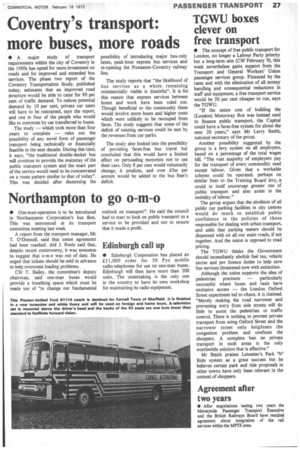TGWU boxes clever on free transport
Page 29

If you've noticed an error in this article please click here to report it so we can fix it.
• The concept of free public transport for London, no longer a Labour Party priority but a long-term aim (CM February 9), this week nevertheless gains support from the Transport and General Workers' Union passenger services group. Financed by the rates and with the elimination of all money handling and consequential reductions in staff and equipment, a free transport service would be 30 per cent cheaper to run, says the TGWU.
"If the entire cost of building the (London) Motorway Box was instead used to finance public transport, the Capital could have a fares-free system for about the next 20 years," says Mr Larry Smith, national secretary of the group.
Another possibility suggested by the group is a levy system on all employers, based on a percentage of the total wages bill. "The vast majority of employers pay for the transport of every commodity used except labour. Given that a workable scheme could be operated, perhaps on similar lines to the Training Board levy, it could in itself encourage greater use of public transport and also assist in the mobility of labour."
The group argues that the abolition of all public car parking facilities in city centres would do much to establish public confidence in the policies of those responsible for dealing with urban transport, and adds that parking meters should be dispensed with on all our main roads, if not together. And the union is opposed to road pricing.
The TGWU thinks the Government should immediately abolish fuel tax, vehicle excise and psv licence duties to help save bus services threatened now with extinction.
Although the union supports the idea of pedestrian precincts — particularly successful where buses and taxis have exclusive access — the London Oxford Street experiment led to chaos, it is claimed. "Merely making the road narrower and preventing entry from side streets will do little to assist the pedestrian or traffic control. There is nothing to prevent private transport from using Oxford Street and the narrower street only heightens the congestion problem and confuses the shoppers. A complete ban on private transport in such areas is the only worthwhile solution that is effective."
Mr Smith praises Leicester's Park 'N' Ride system as a great success but he believes certain park and ride proposals in other towns have only been relevant in the context of shoppers.












































































































